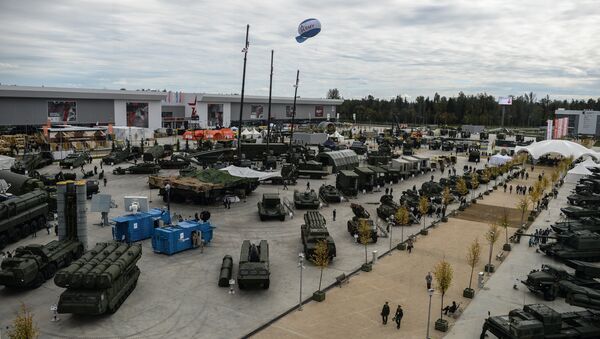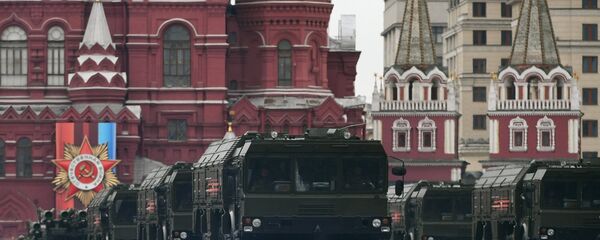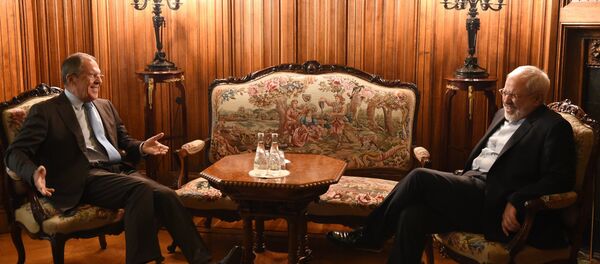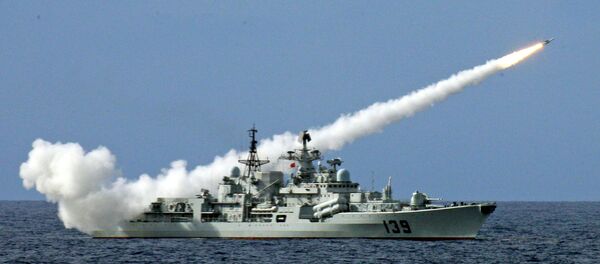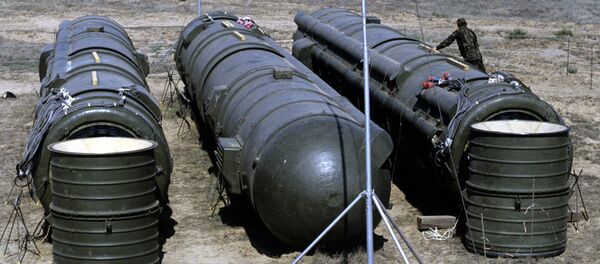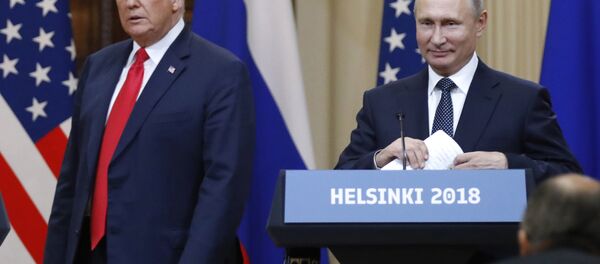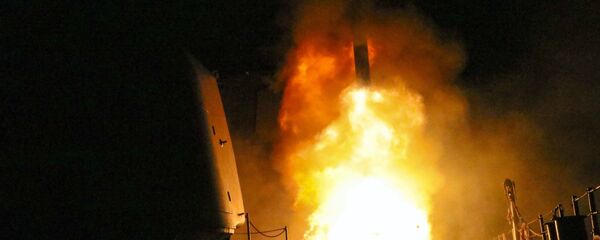On Saturday, US President Donald Trump told reporters that the country would "terminate" the INF treaty, claiming that Russia had not honored the agreement. He also said that China, which is not a signatory to the treaty, should also have been bound by such an agreement. On Monday, the president pledged that the United States would be stepping up its nuclear arsenal until Russia and China "come to their senses."
The INF treaty was signed between the Soviet Union and the United States in December 1987, and required the parties to destroy their ground-launched ballistic and cruise missiles with ranges of between 500 and 5,500 kilometers (from 310 to 3,417 miles). The INF treaty has an unlimited duration and each side can terminate it by providing compelling evidence to substantiate its decision.
READ MORE: Putin to Bolton: Russia Surprised With Unfriendly US Moves
Russia and the United States have repeatedly accused each other of violating the treaty. Moscow, in particular, stated that the United States was deploying launchers for Tomahawk missiles in Romania and Poland, which was prohibited under the agreement.
Another Dangerous Step Toward New Arms Race
According to Doctor M. V. Ramana, the Simons chair in Disarmament, Global and Human Security at the Liu Institute for Global Issues at the University of British Columbia, the US move is another step that pushes the world closer to a new arms race.
"I think the decision by President Trump is another dangerous step towards a new arms race between the United States and Russia, with the United States starting the process for the most part. It is totally unnecessary and will increase the likelihood of war," Ramana told Sputnik.
Gotz Neuneck, a professor of physics and acting co-director of the Institute of Peace Research and Security Policy at the University of Hamburg (IFSH), agreed that the rupture of the landmark arms control treaty would only embolden those who fallaciously believe that "more nuclear weapons" could ensure national security.
It also puts Europe at greater risk of a nuclear threat, he warned.
"[Trump] brushes aside a central arms control and disarmament treaty and strengthens all who think that more nuclear weapons are in favor for national security. This is also very bad news for European Security because we are losing a key treaty which helped to reduce the nuclear threat in Europe significantly," Neuneck told Sputnik.
Dr. Nikolai Sokov, a senior fellow at James Martin Center for Nonproliferation Studies of the Middlebury Institute of International Studies, shared the opinion that the US pullout from the INF treaty would send a ripple effect on other arms control regimes.
"The withdrawal will have negative consequences on several levels simultaneously. The arms control framework will be severely weakened. Although the INF Treaty has a number of weaknesses and is generally outdated, it nonetheless helped enhance predictability and prevented deployment of dangerous weapons in Europe and elsewhere. By default, the few remaining arms control regimes (first and foremost the New START Treaty) will weaken as well," Sokov told Sputnik.
READ MORE: Mattis Sides With Trump on US Withdrawal From INF Treaty With Russia — Pentagon
Risks of US Nuclear Arsenal Build-Up
The US potential withdrawal from the INF treaty could be seen as a move toward lifting another constraint and launching the development of new weapon systems, Ramana of the Liu Institute for Global Issues at the University of British Columbia suggested.
"I think it is very likely that the United States will start the process of developing new weapon systems. There is still one remaining constraint, the New START treaty. But that treaty is due to expire in 2021 unless the United States and Russia agree to extend it. I don’t see that happening under the current circumstances," he said.
According to Neuneck, Congress has approved the development of new sea- and land-based missiles as well as land-based version of INF non-compliant missiles, even though the United States, along with Russia, has "enough nuclear weapons and delivery systems to hold all targets worldwide at risk."
"US Congress has already made a budget decision to develop new sea- and land based missiles as well as land-based version of INF non-compliant missiles. The collapse of INF would open the door of a new arms race between both nuclear superpowers. In the long-run that could also foster the way of new nuclear warheads which have to be tested," the expert stressed.
READ MORE: US Seeks Advantage Over Russia by Deploying Missiles in Eastern Europe — Writer
Sokov of the Middlebury Institute of International Studies did not rule out the increase of the US nuclear stockpile in the future, stressing that the new quality of weapons and the strategic situation would matter much more.
"An increase in the number of weapons is likely, although I do not foresee a very large increase. More dangerous is the new quality of weapons and the new quality of the strategic situation," he opined.
He also noted that, given the current trends, the deployment of intermediate-range land-based missiles in Europe and Asia seemed "almost inevitable," which is however fraught with risks of "a rift within NATO between ‘old’ and ‘new’ members," as potential opponents and supporters of this type of US weapons to be deployed in the region.
"Regardless of whether Russia has already developed a GLCM (ground-launched cruise missile), one can be created in short time on the basis of the available SLCM (Kalibr). The United States has authorized research on a new GLCM (so far without entering a violation – the Treaty does not ban research, only testing), so the process has been launched as well. Deployment is possible in several regions of the world and, given the trends in policies of all major actors, is almost inevitable," Sokov said.
READ MORE: Patrushev Meets With Bolton, Discuss INF Treaty Amid US Plans to Exit It
Pierre Henrot, a Brussels-based independent expert on nuclear arms control similarly noted that the rupture of the INF treaty would open Pandora's Box, giving the sides freedom to implement the accumulated relevant research and development achievements.
Miles Pomper, a senior fellow in the Washington D.C. office of the James Martin Center for Nonproliferation Studies (CNS) of the Middlebury Institute of International Studies at Monterey, in contrast, found it difficult to predict whether the US move would result in "more nuclear arms" or "just development of missiles of prohibited range."
"It is not clear if this will spur more nuclear arms or just development of missiles of prohibited range (500-5500 km) that might carry conventional arms. To date, Congress has only provided support for conventionally-armed missiles," Pomper told Sputnik.
Termination of Treaty Worst Option
Joshua Pollack, a senior research associate from the Middlebury Institute of International Studies, in turn, doubted that the potential US withdrawal from the INF treaty would bring about any advantages to Washington.
"I am skeptical of the merits of Trump’s decision to withdraw from INF. I’m unaware of any American plans to deploy ground-based missiles of this class anywhere in the world. No suitable missile system exists in today’s American arsenal, and no program to develop one appears to be underway. In time, that may change," he told Sputnik.
READ MORE: Japan's Atomic Bomb Survivors Urge Trump not to Leave Key Nuclear Treaty
According to Pollack, the current US move has nothing to do with the 2001 decision of the George W. Bush administration to pull out of the Anti-Ballistic Missile Treaty, another landmark agreement with the Soviet Union.
"Then, it was America that chafed under the limits of ABM [amid its plans to deploy a national missile defense system]; today, it is Russia that chafes under the limits of INF. As our British cousins might say, Trump has scored an ‘own goal,’" he claimed.
Dr. Thomas E Shea, an adjunct senior fellow at the Federation of American Scientists, in his comments to Sputnik described the US move as "regrettable" and did not rule out that the US would push for stepping up its arsenal amid Russia’s alleged violations of the INF treaty.
"If the U.S. sees the steps being taken by Russian forces on the border with NATO States, then it would not surprise me to see a call for additional nuclear arms. Hopefully not … Both sides posture. Finding solutions leading to peace should be our common cause.
According to Sokov of the Middlebury Institute of International Studies, it was actually the loudspeaker diplomacy in the form of mutual public accusations of violations that preordained the treaty's current demise.
"All these mutual accusations had to be explored in-depth within the Standing Verification Commission (SVC). It is important to understand that mutual accusations and suspicions are inevitable in the implementation of any treaty, which is why parties create relevant mechanisms," he stressed.
Meanwhile, the termination of the agreement, despite its drawbacks and somewhat outdated nature, threatens Europe with "a return to the dangerous early 1980s," as the deal was primarily meant to eliminate intermediate-range missiles with very little short warning time, the expert warned.
"In addition to the above, it is vital to keep in mind that intermediate-range missiles allow for only short warning time – either they have short flight time (like Pershing II) or are difficult to detect (cruise missiles). Meaning, in case the early warning systems detect a launch, there will be little or no time to ascertain the reliability of that warning and/or contact the other party. The situation will call for an immediate response – that is, a mistaken warning will be significantly more likely to result in war than is the case of strategic weapons. Short warning time was one of the primary reasons for the INF Treaty in the first place," Sokov pointed out.
Henrot agreed that scrapping the treaty would be worst possible option, despite the treaty's "obsolete" nature, "given the technical development of cruise missiles by both camps" and the fact that both countries "can deploy nuclear cruise missiles on combat ships in the Mediterranean, in the Black Sea or the Baltic Sea without breaking" the agreement, stressing that the latter should be preserved and updated.
The views and opinions expressed by the speakers do not necessarily reflect those of Sputnik.

